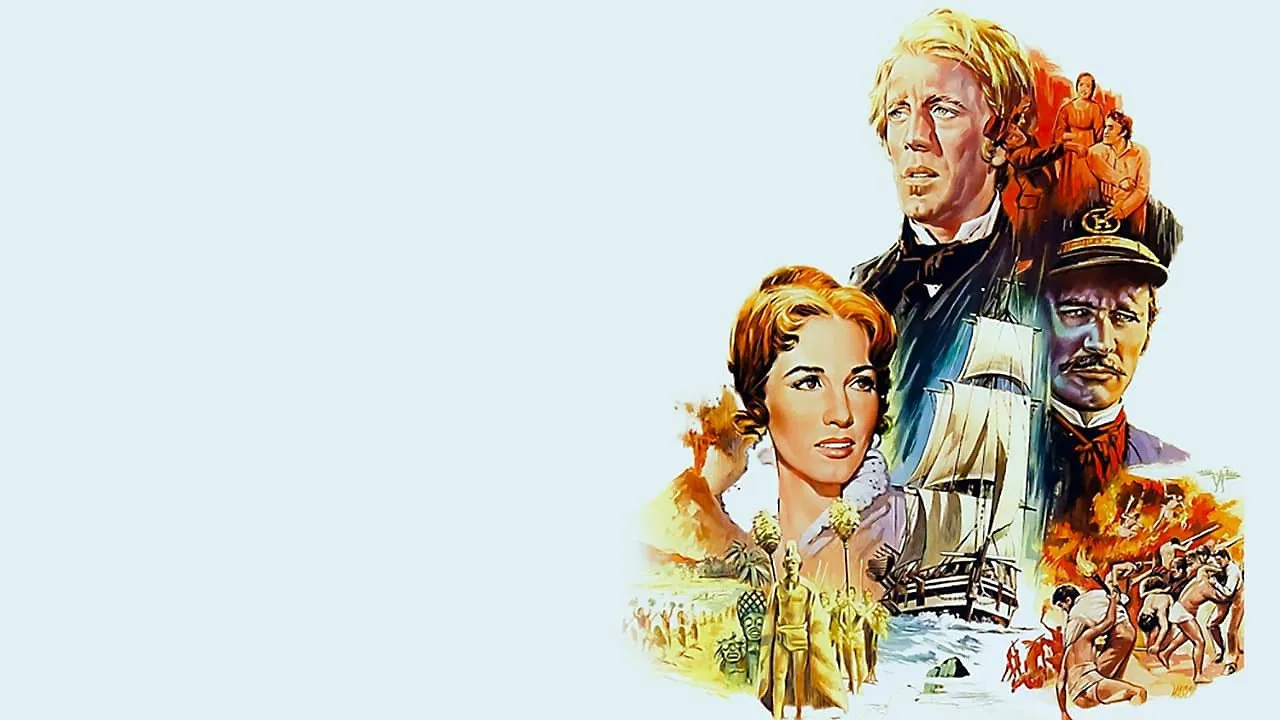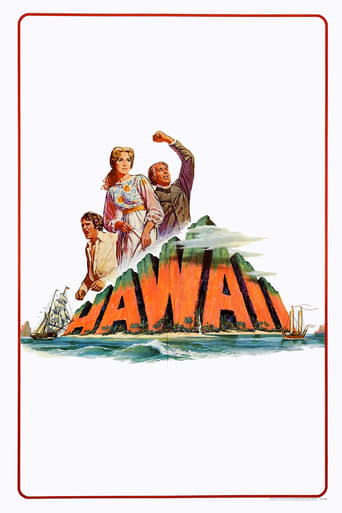

Seems like Marlon Brando should have been in this film. I don't know what part he could have played, but maybe a part (only a major part for my Marlon) could have been made up for Marlon. At any rate, I would not have wanted him to portray Abner Hale or any of those other stodgy, uptight ministers, lol. Maybe Marlon's character could have gone for Julie Andrews, then killed Hale the ignorant preacher-man. I have read the enormous novel upon which this film is based. This movie seems long, but the novel is gigantic. The beginning of this book goes on forever in describing the history of Hawai'i, before the white man ever arrived. It also tells lengthy litanies about the origins of the native gods and indigenous beliefs. The missionaries wanted to claim these islands for their religion. This film goes to great lengths to illustrate that. I have been to Hawai'i. I saw their beautiful beaches and exotic plants. The weather is breathtaking. I visited Honolulu, and toured a beautiful museum wherein were displayed artifacts from the lives of late 19th-century Hawai'ian royalty. It seems that by that time, in real life, the royal family of Hawai'i had intermarried with white business and political figures. The white people were building agricultural empires there, for example enormous pineapple production (famous canned pineapple brand names you have heard of). The British also were interlopers in the islands. The Hawai'ian royal family seemed to like the British 19th Victorian fashions and polite manners more than they liked the Americans and their less elegant ways, but the island nation eventually became an American state. The last queen of Hawai'i had been forced to abdicate. She had been married to a white man. I also saw a display there of a life-size figure of James Michener, sitting in a white tent and typing the novel "Hawaii" on his manual typewriter. Did white people ruin Hawai'i? I hope not. It is a beautiful place. I hope to visit there again soon. Observations: Malama (Alii Nui) stole the show, in this film. 10/10
... View MoreBreaking out of the mold of singing nannies, Julie Andrews plays a Bostonian socialite who marries a missionary (Max Von Sydow) and heads to the wilds of Hawaii where her husband works on converting the natives to Christianity. A ship's captain (Richard Harris) sets his sights on the lovely but fragile Andrews which tests the sanctity of marriage. Obsessed with converting what he believes to be a sinful life of the very sexual natives, Von Sydow neglects his wife, leading to tragedy and a climactic confrontation between Von Sydow and Harris. The fact that Harris would go on to play King Arthur in the film version of "Camelot" while Andrews was unable to reprise her role as Guenevere makes this an interesting pairing during this time.Beautiful to look at and superbly acted, this takes James Michener beyond the tales of the South Pacific and Bali Hai to what would later become America's 50th State. Andrews totally underplays her role here after flamboyantly playing Mary Poppins and Maria Von Trapp, so this is a nice change of pace for her. Von Sydow is a bit hammy in spots, but if you consider the type of character he is playing, that is not entirely out of place. The acting honors go to Jocelyn La Garde, the Hawaiian born native chosen to play the last Queen. Speaking her few English language lines phonetically, the hefty La Garde is lovable, touching and fierce. And yes, that is Carroll O'Connor, the future Archie Bunker here, playing Andrews' father.This also contains one of the most beautiful music scores (by Elmer Bernstein) to grace an epic film of the 1960's, one you'll not soon forget. While some of the historical references have been questioned in regards to their accuracy, the film paints a realistic portrayal of the hardships faced by mainland Americans as they face the elements of a land they can never quite understand. This is the type of film that should be given occasional big screen re-releases so today's audiences can see how epics used to be made without resulting in headaches due to overpowering sound and computer generated effects.
... View MoreBy this point, the mid-1960s, the old-style biblical epics had more or less died out completely, but epics of other kinds were still reasonably popular. This story of missionaries in the first half of the 19th century, adapted from a James A. Michener novel and made a year before the abandoning of the Hollywood production code, is in fact a polemic against rigid adherence to Christian scriptures. At its centre is an overly pious and sometimes hypocritical preacher, the kind of mind which would have believed in all those unswervingly self-righteous bible flicks of the previous decade.But Hawaii is not some flagrant and roughshod denunciation of church and faith. The picture was adapted (quite liberally) from its source by acclaimed screenwriters Daniel Taradash and Dalton Trumbo, and it has in particular Trumbo's tendency to treat all his characters with respectful and human portrayals, in spite of what antagonisms they may have towards each other. Thus while Max von Sydow is seen at turns as a callous fanatic, a trumped-up fool and a general negative influence, we first see him as a shy yet well-meaning youngster, clumsily trying to woo Julie Andrews. In these early scenes he is somewhat endearing figure, and even though most viewers will not condone much of what he later does, this first impression sticks with us, preventing us from completely despising him and allowing us to believe in his wife's devotion to him.Max von Sydow was an excellent choice for this role. Admittedly his Swedish accent is a bit of a non-sequitur, but he is perfect at bringing out both the sympathetic young lad and the unshakable preacher. His performance occasionally seems to border on the hammy, but this is acceptable because it fits in with his strength of character and the earnest manner with which he takes up his ministerial duties. Julie Andrews is great too. After having made her name with the more or less fantasy figures of Mary Poppins and Maria von Trapp there's a strange kind of poignancy seeing her suffer the strains of being a more realistic wife and mother. She seems sadly underused here however, although apparently she was the main victim of the cuts in the edited version I have, which is a real pity. Richard Harris and Gene Hackman bring their forceful presences to make some of the more powerful statements in the dialogue, while Jocelyn LaGrande makes a terrific impact with her full-of-life performance. Although she spoke no English and learned her lines phonetically, it's incredible the way she communicates meaning and emotion around those words.Hawaii was the first large-scale picture directed by George Roy Hill, and by and large he handles the broad canvas well. Of note is that fact that he gives a constant life and rhythm to the island, often featuring a few figures working in the background or framing a character with gently swaying foliage. Hill was of course a child of the New Wave and this is evident in the occasional zoom or whip pan, but his touch is generally quite light and minimalist. Unlike some of the other younger directors around at this time he favours long takes with few close-ups. The only trouble with this is doesn't seem to quite have developed the knack of subtly making a point within the frame, sometimes using the camera to force our attention on something. An example is when Iliki runs to greet Richard Harris's ship, throwing off her western dress, a moment which seems rather contrived and clunky by the way the camera pans down onto the discarded garment.Hawaii is a far from perfect picture, being neither quite the stunning extravaganza that epics are generally meant to be, nor the stirring human drama it also seems to aspire to. However, it has many moments which come close to both goals, and most importantly has a very honest humanity to it – something so many epics lack – and this allows it to speak its message directly without ever threatening to alienate its audience.
... View MoreBeautifully made, wonderful music BUT gets very BORING mainly due to Von Sydow's character. It was an odd choice for Julie Andrews as she was the Queen of Hollywood at the time but, as usual, she gives a lovely performance. The other performances are good too, it is just Von Sydow's character constant bible bashing that simply starts irritating. Elmer Bernstain's music is superb and the photography visually stunning. Very long and obviously some omissions from the original Michener novel. Would have been interesting to see what Rodgers and Hammerstein could have done with it after their masterpiece South Pacific, based also on Michener novels. Worth watching if you can stay awake!!
... View More